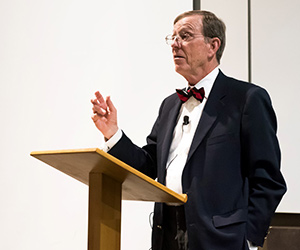 Edgar said the 17 Carolina backcountry battles -15 of which were victories for the
patriots - helped lead to the ultimate American victory at Yorktown, Virginia, on
Oct. 17, 1781.
Edgar said the 17 Carolina backcountry battles -15 of which were victories for the
patriots - helped lead to the ultimate American victory at Yorktown, Virginia, on
Oct. 17, 1781.  He noted that the historic Battle of Cowpens in Spartanburg County in January of
that year was the "only pitched battle in the American Revolution where British troops
ran from the field."
He noted that the historic Battle of Cowpens in Spartanburg County in January of
that year was the "only pitched battle in the American Revolution where British troops
ran from the field."
ROCK HILL, SOUTH CAROLINA - The 17 Carolina Backcountry battles fought between 1780-81
have never received much national attention but were very important to the American
colonists gaining independence from the British.
Walter B. Edgar, professor emeritus at the University of South Carolina and well-known host of the
radio program "Walter Edgar's Journal," made the point to more than 130 people gathered March 22 in Winthrop University's
Kinard Auditorium. The event, sponsored by Friends of Dacus Library, was on "The American Revolution in the Carolina Backcountry."
Edgar said the 17 Carolina Backcountry battles -15 of which were victories for the
patriots - helped lead to the ultimate American victory at Yorktown, Virginia, on
Oct. 17, 1781. He noted that the historic Battle of Cowpens in Spartanburg County in January of that year was the "only pitched battle in the
American Revolution where British troops ran from the field."
Lord Charles Cornwallis, the British Commander, had already suffered gravely in the Palmetto State prior
to the Battle of Guilford's Courthouse in North Carolina on March 15. Even though
that particular battle was generally viewed as a draw, Cornwallis' losses convinced
him to move into Virginia rather than retreat back to "the hornet's nest" further
south.
Edgar quoted directly from civilians, ministers and soldiers involved in the conflict
in Carolina to add flavor to his thesis of the backcountry's impact on the Revolution's
final outcome. James Williams, who died at the Battle of Kings Mountain, took up arms out of necessity to defend his "rights and liberties," as well as those
of his children.
The professor also told of the courageous roles of women of the Revolutionary period like Martha Bratton of York County who refused to betray her husband in service with "Sumter's army"
and young Jane McJunkin who bested a British officer in a tussle over a quilt.
He likewise recounted the familiar story of 14-year-old Andrew Jackson's refusal to shine a British officer's boots and having his arm slashed by a saber. Less familiar
is what happened to his younger brother Robert, age 13, who also refused and was struck
on the head by a similar slash, dying two weeks later of gangrene.
At times, Edgar said, Francis Marion's famous band of fighters was a truly integrated unit consisting of whites, Catawba Indians and African Americans.
He stressed that such were actual historical facts, not "alternative facts." This
elicited laughter.
Edgar made reference in his lecture to Mel Gibson's movie "The Patriot," which was a highly fictionalized account of the revolutionary conflict in the Carolinas.
The movie, he said, did reflect the combination of idealism and revenge of the period,
but many of the scenes were misrepresentations of actual events. The big battle in
the movie, supposedly representing the Battle of Guilford Courthouse, was not in truth
a total route of the British as the movie suggests.
For more information, contact Ronnie Faulkner, head of technical services and professor at Winthrop's Dacus Library, at 803/323-2262
or faulknerr@winthrop.edu.